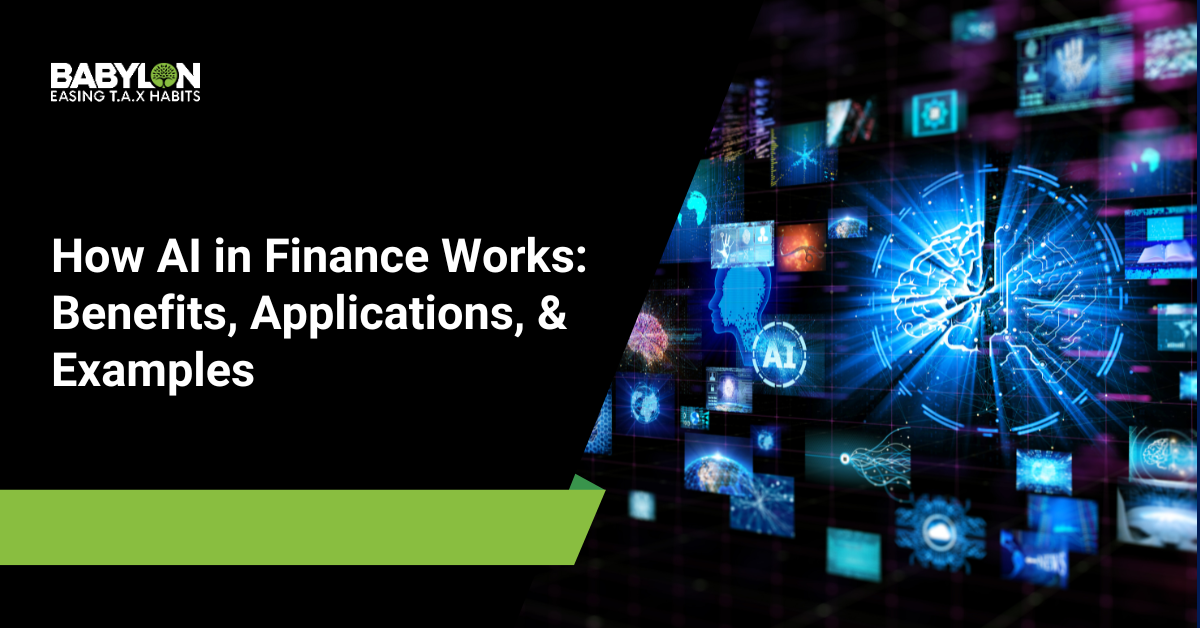The finance sector has one of the highest AI adoption rates across industries. This is because AI offers unparalleled capabilities in automating processes, enhancing decision-making, and managing large data sets.
AI can now act as a finance consultant, providing real-time insights, personalized financial advice, and advanced risk assessments. From fraud detection to portfolio management, AI tools are transforming every aspect of finance.
In this article, we’ll discuss how AI is driving innovation in finance, its key benefits, and real-world applications.
What is Artificial Intelligence in Finance?
Artificial Intelligence (AI) in finance refers to the use of advanced algorithms, machine learning, and data analytics to optimize processes in financial institutions. It helps with everything from task services, risk assessment and fraud detection to personalizing customer interactions. AI technologies enable financial firms to process massive amounts of data, automate routine tasks, and make faster, more accurate decisions.
What are the Key Applications of AI in Finance?
AI offers a variety of benefits to the financial sector:
Improved Efficiency
AI automates routine tasks, such as data entry and report generation. This boosts efficiency and cuts operational costs.
For example, AI-powered automation in banking can handle repetitive work such as managing routine customer inquiries, allowing staff to focus on more strategic activities.
Enhanced Fraud Detection
The global cybercrime damage is expected to hit $10.5 trillion USD annually by 2025. This highlights the increasing need for advanced security measures in finance.
AI-based systems, such as those used by CitiBank, analyze vast amounts of transactions in real-time to identify suspicious behavior, allowing for faster and more accurate detection than manual methods.
Personalized Banking
AI allows banks to tailor services to individual customers by analyzing large datasets, including transaction histories, spending patterns, and personal preferences. This data-driven approach helps banks offer personalized recommendations, financial insights, and more relevant products.
A 2024 study on banking customers in Kuwait highlights how AI-driven hyper-personalization is gaining traction. The study revealed that customers are increasingly open to the benefits of personalized services, appreciating the convenience and customized financial advice it offers.
However, they expect transparency, control over how their data is used, and strong cybersecurity measures before they’re willing to share personal information
Customer Service Optimization
AI-powered finance AI assistants such as chatbots and virtual agents offer real-time assistance to customers. Chatbots like Beth of Babylon2k can handle customer queries 24/7, reducing the workload on human agents.
This capability leads to reduced waiting times and enhances customer satisfaction—a major shift for the financial sector, where such instant support was nearly impossible before the advent of AI.

Beth is Babylon2K’s on-page chatbot.
Regulatory Compliance
AI helps institutions comply with complex regulations by automating the monitoring of legal requirements. This is crucial to avoid costly penalties and ensure smooth operations.
For example, JPMorgan Chase uses their software called “COIN” (Contract Intelligence) to analyze commercial loan agreements. What once took 360,000 hours of work from lawyers and loan officers is now completed by the software in mere seconds.
This automation has not only cut down on loan-servicing errors but also saved the bank significant time and resources each year.
Credit Risk Assessment
Traditionally, credit risk assessment involved manual evaluation processes that relied heavily on limited data like credit scores, income statements, and payment histories. Loan officers had to review applications one by one, often using rigid criteria that could overlook nuanced risks. This manual process was time-consuming and prone to human error.
AI has transformed this by analyzing vast datasets, including alternative data sources like online behavior and utility payments, providing a more accurate view of creditworthiness.
A standout example is Zest AI, which partners with banks, credit unions, and auto lenders to boost loan approvals while managing credit risk by leveraging AI. Zest-built models have led to an average 15% rise in loan approval rates, all while maintaining the same level of credit risk.
Automation in Loan Processing
AI expedites the loan approval process by quickly assessing applications and making risk-based decisions. Traditional methods could take weeks, but AI allows for real-time approvals, improving both speed and accuracy.
A study by McKinsey revealed that banks using AI have reduced loan processing times by up to 70%. For customers, this means faster access to funds, quicker approval decisions, and a more seamless experience. For banks, it results in increased operational efficiency, lower processing costs, and the ability to handle more loan applications without additional staff.
Investment and Portfolio Management
Robo-advisors, which automate portfolio management using AI, offer personalized asset allocation and real-time adjustments based on the investor’s changing circumstances, such as income, age, or market conditions. These platforms not only reduce costs for investors but also minimize human bias, leading to more data-driven decisions.
Wealthfront, for example, uses AI to build customized portfolios by analyzing factors such as a client’s financial objectives, risk tolerance, and time horizon. It all starts with a simple risk assessment questionnaire, and AI takes it from there to create and manage a diversified portfolio that aligns with the client’s needs.
Challenges and Future Perspectives on Finance AI
While AI offers many benefits, the financial industry faces challenges related to AI implementation.
- Data Privacy Concerns: As AI depends heavily on data, concerns about data privacy and security arise, especially in regions with strict regulations like GDPR in Europe.
- Regulatory Hurdles: AI systems must comply with ever-evolving financial regulations, which can be complex and require continuous updates.
- Ethical Concerns: AI systems must be transparent in decision-making, especially in areas like loan approvals and risk assessments, to avoid biases.
Looking ahead, AI is expected to continue revolutionizing finance, particularly in areas like audit solutions, fraud prevention, and personalized banking. Financial institutions that embrace AI now will be better positioned to navigate future challenges and maintain a competitive edge.
Elevate Your Financial Strategy with Babylon2K
AI is reshaping the financial world, delivering faster processes, smarter decisions, and personalized solutions across all sectors.
Babylon2K is at the forefront of this transformation. When you partner with us, you’ll gain access to innovative technology that drives efficiency, reduces risk, and creates new growth opportunities. Our accounting services make financial management smoother, while our audit solutions ensure your business stays compliant and accurate, giving you the confidence to focus on what matters most
Sign up as a client and request a quote today, and let Babylon2K revolutionize your financial future.
For more inquiries, message our AI chatbot, email us at [email protected], or contact us via Viber/WhatsApp at +63-927-945-3382.






